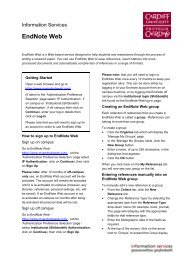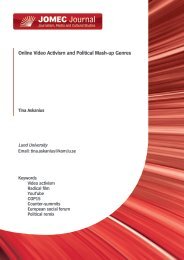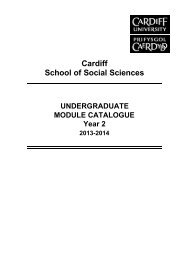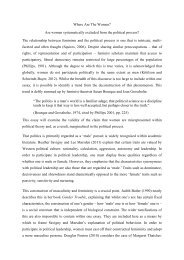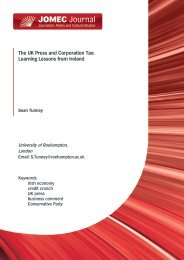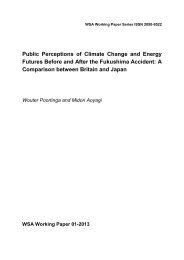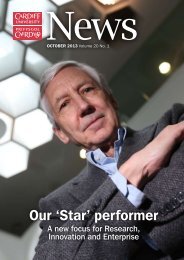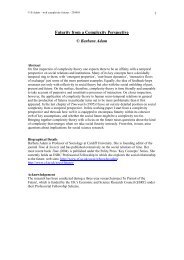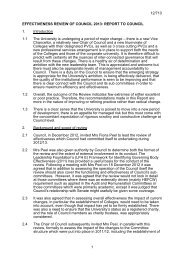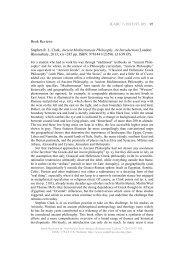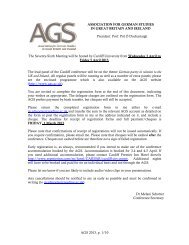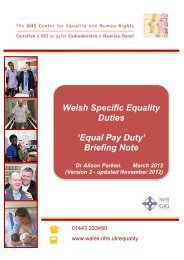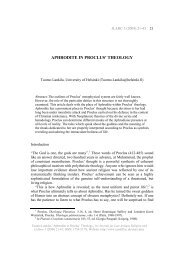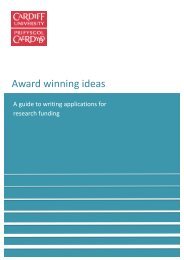January's issue of Cardiff University News
January's issue of Cardiff University News
January's issue of Cardiff University News
Create successful ePaper yourself
Turn your PDF publications into a flip-book with our unique Google optimized e-Paper software.
<strong>News</strong><br />
January 2013 Volume 19 No.4<br />
Charting our course<br />
Research with worldwide impact
Introduction<br />
Introduction<br />
Singapore, 2005. Olympics president Jacques Rogge is about to announce the<br />
location <strong>of</strong> the 2012 Games. He hesitates, then pronounces one word - “London”.<br />
You all know what happened next,<br />
but did you know <strong>Cardiff</strong> <strong>University</strong><br />
had a hand in that historic decision?<br />
The London bid pledged to use the<br />
“eco-footprint” approach developed<br />
for sports events like the FA Cup by<br />
our Centre for Business, Relationships,<br />
Accountability, Sustainability and<br />
Society (BRASS). Dr Andrea Collins <strong>of</strong><br />
BRASS then joined the carbon footprint<br />
planning team for last year’s Games –<br />
now recognised as the most sustainable<br />
ever held.<br />
We don’t help successful Olympic<br />
bids every day, but our research does<br />
improve daily lives in almost every way<br />
imaginable. If you’ve noticed the BBC’s<br />
coverage <strong>of</strong> the Welsh Government<br />
has improved, that’s almost certainly<br />
down to work on reporting practice at<br />
the School <strong>of</strong> Journalism, Media and<br />
Cultural Studies. And if your GP is no<br />
longer prescribing antibiotics for every<br />
cough and splutter, that’s the influence<br />
<strong>of</strong> Pr<strong>of</strong>essor Chris Butler and his team<br />
at the School <strong>of</strong> Medicine as they fight<br />
harmful bacteria’s growing resistance to<br />
drugs. The economy affects us all, and<br />
one <strong>of</strong> the most pr<strong>of</strong>ound thinkers on<br />
the subject, <strong>Cardiff</strong> Business School’s<br />
Pr<strong>of</strong>essor Patrick Minford, this month<br />
outlines how his research helped prompt<br />
Colleagues across<br />
the <strong>University</strong> are<br />
doing high quality<br />
research that is<br />
delivering real<br />
benefits<br />
a fundamental shift in UK economic<br />
policy.<br />
So we help in a variety <strong>of</strong> spheres –<br />
pr<strong>of</strong>essional, political, medical and<br />
many others. Our work also reaches<br />
right across the country and right<br />
around the world. In Wales, Pr<strong>of</strong>essor<br />
Colin Williams <strong>of</strong> the School <strong>of</strong> Welsh<br />
called for action on weaknesses in<br />
Welsh language law and for a Welsh<br />
Language Commissioner – calls which<br />
have now been met. Just across the river<br />
Severn, <strong>Cardiff</strong> archaeologists have<br />
bought the SS Great Britain another 200<br />
years <strong>of</strong> life, preserving it as a major<br />
international tourist attraction.<br />
Every area <strong>of</strong> the <strong>University</strong>’s<br />
research effort – in life sciences,<br />
STEM subjects, humanities and<br />
social sciences - has an effect far<br />
beyond our campus. For example,<br />
the eyecare <strong>of</strong> children with Down’s<br />
syndrome has been transformed by<br />
Dr Maggie Woodhouse’s work at<br />
the School <strong>of</strong> Optometry and Vision<br />
Sciences. Mathematicians are playing<br />
their part in healthcare too, with<br />
modelling systems that allow the NHS<br />
to plan patient treatment needs more<br />
efficiently and to save money. The<br />
formidable challenge <strong>of</strong> uniting the<br />
Anglican Church’s approach to canon<br />
law has been resolved by <strong>Cardiff</strong> Law<br />
School’s Pr<strong>of</strong>essor Norman Doe. In<br />
the humanities, Dr Lisa El Rafaie’s<br />
understanding <strong>of</strong> cartoons and comics<br />
is helping deliver vital information<br />
about HIV/AIDS to children in South<br />
Africa; the country in the World with<br />
the single highest number <strong>of</strong> people<br />
living with HIV.<br />
Colleagues across the <strong>University</strong><br />
are doing high quality research that<br />
is delivering real benefits. And our<br />
pr<strong>of</strong>essional teams are making sure<br />
we engage with policy-makers,<br />
businesses, charities and local<br />
communities so they can take full<br />
advantage <strong>of</strong> our academic brilliance.<br />
But I still want us to do more. I want<br />
the first question about every new<br />
research project to be “who will it<br />
help?” – not just “which journal will<br />
publish it?”.<br />
We need to embed effects on the wider<br />
World into everything we do as a<br />
World-class <strong>University</strong>.<br />
We have a great foundation to build<br />
on – as the following pages will show<br />
you.<br />
Pr<strong>of</strong>essor Chris McGuigan<br />
Pro Vice-Chancellor, Research,<br />
Innovation & Enterprise<br />
It’s “green, green, green” – not<br />
“money, money, money”<br />
Environmental charities are launching<br />
a new type <strong>of</strong> campaign, appealing to<br />
consumers’ community spirit rather<br />
than their self-interest.<br />
Traditional campaigns promoting<br />
green behaviour have tried to trigger<br />
individuals’ sense <strong>of</strong> prestige and status.<br />
Now, psychological research<br />
from <strong>Cardiff</strong> <strong>University</strong> shows<br />
environmentalists will enjoy better<br />
results if they appeal to people’s<br />
concern for the welfare <strong>of</strong> others.<br />
Major organisations like Oxfam,<br />
2<br />
Friends <strong>of</strong> the Earth and the WWF have<br />
taken the research on board and are<br />
changing their advertising strategies.<br />
The <strong>Cardiff</strong> research has proved that<br />
raising someone’s awareness <strong>of</strong> one<br />
particular value, like helpfulness, makes<br />
their behaviour more likely to reflect<br />
linked values, like forgiveness. At the<br />
same time, behaviour that demonstrates<br />
opposing values, such as powerfulness,<br />
becomes less likely.<br />
Pr<strong>of</strong>essor Greg Maio and colleagues at<br />
the <strong>University</strong>’s School <strong>of</strong> Psychology<br />
ran an experiment asking members <strong>of</strong><br />
the public to sort words from a list. One<br />
group was asked to pick out words like<br />
“ambitious” and “successful” while a<br />
second was asked to find words like<br />
“forgiving” and “honest”. Both groups<br />
were then asked to complete a puzzle<br />
and to say if they would take part in<br />
further research for free. Participants<br />
who had been asked to find words<br />
linked to ambition were more likely to<br />
solve the puzzle – but less likely to <strong>of</strong>fer<br />
future help.<br />
The research shows that environmental<br />
campaigns encouraging greener<br />
behaviour through self-interest are<br />
likely to backfire. For example,<br />
motivating people to put solar panels<br />
on their homes as a status symbol<br />
may encourage other self-enhancing<br />
behaviour which is less environmentally<br />
friendly, such as jetting <strong>of</strong>f on an<br />
expensive foreign holiday.<br />
As a result, green organisations are<br />
re-thinking their campaigns to make<br />
a greater appeal to selfless behaviour.<br />
The new approach has helped inspire<br />
the WWF’s “Earth Book” campaign,<br />
which encourages the public to “stand<br />
up for our world and everything we love<br />
about it.” The Waste Watch recycling<br />
campaign is now engaging the public<br />
by addressing community concerns.<br />
And a dozen leading UK conservation<br />
charities have linked forces in a new<br />
initiative, Common Cause for Nature,<br />
aiming to make their communications<br />
more effective in the light <strong>of</strong> the <strong>Cardiff</strong><br />
research.
At the forefront <strong>of</strong> sustainability<br />
Putting the ‘environment’ at the<br />
heart <strong>of</strong> the London Olympics<br />
Major sporting events such as the<br />
London Olympics are considering their<br />
“ecological footprint” on local and<br />
global communities with the help <strong>of</strong><br />
<strong>Cardiff</strong> <strong>University</strong> research.<br />
Events such as the 2012 London<br />
Olympic and Paralympic Games and<br />
key organisations such as UK Sport are<br />
increasingly using research tools such<br />
as the ecological footprint to measure<br />
the environmental impacts <strong>of</strong> their<br />
events.<br />
The uptake <strong>of</strong> such impact assessment<br />
methods stems from interdisciplinary<br />
research undertaken by Dr Andrea<br />
Collins from the <strong>University</strong>’s School <strong>of</strong><br />
Planning and Geography, and Pr<strong>of</strong>essor<br />
Max Munday and his team at <strong>Cardiff</strong><br />
Business School.<br />
The research aims to shift emphasis<br />
from a narrow assessment <strong>of</strong> the<br />
economic impact <strong>of</strong> major events<br />
to one that also considers their<br />
environmental impacts.<br />
“Governments and organisations<br />
<strong>of</strong> major events worldwide are<br />
increasingly recognising the importance<br />
<strong>of</strong> assessing the environmental impact<br />
<strong>of</strong> resource use,” according to Dr<br />
Andrea Collins, who has been leading<br />
work to establish the ‘ecological<br />
footprint’ <strong>of</strong> major events in the UK.<br />
“Our research has proved crucial in<br />
changing organisational thinking from<br />
one that focuses on the economic<br />
benefits <strong>of</strong> an event to one that<br />
recognises the environmental impact <strong>of</strong><br />
resource use,” she added.<br />
The work, which began at the<br />
<strong>University</strong>’s ESRC BRASS Research<br />
Centre in 2003, has been used to<br />
measure the ecological footprint <strong>of</strong><br />
<strong>Cardiff</strong>, <strong>Cardiff</strong>’s International Sports<br />
Village, school meals and major<br />
sporting events like the 2004 FA Cup<br />
Final, a RBS Rugby Six Nations fixture<br />
and the UK stages <strong>of</strong> the 2007 Tour de<br />
France.<br />
Dr Collins adds: “No longer are the<br />
financial benefits <strong>of</strong> an event good<br />
enough when considering hosting a<br />
major event.<br />
“That’s why we have been working<br />
alongside UK Sport to help develop a<br />
new EventIMPACT toolkit which can<br />
be used by event organisers to assess<br />
the much wider impacts and benefits <strong>of</strong><br />
hosting their chosen events.”<br />
<strong>Cardiff</strong>’s research and its engagement<br />
with policy <strong>of</strong>ficers in measuring<br />
the city <strong>of</strong> <strong>Cardiff</strong>’s ecological<br />
footprint has also led other bodies<br />
and governments across the world to<br />
promote corporate engagement with<br />
environmental impact.<br />
The United Arab Emirates, Auckland<br />
Council and the Ministry <strong>of</strong><br />
Environment in Japan have all adopted<br />
<strong>Cardiff</strong>’s unique approach.<br />
Meeting the world’s<br />
demand for edible oils<br />
Oilseed rape<br />
Identifying and removing the ‘cap’<br />
that limits the level <strong>of</strong> oil produced<br />
from crops like oil palm, soybean<br />
and oilseed rape, could help meet<br />
the world’s insatiable demand for<br />
edible oils.<br />
“Oil crops are a vital agricultural<br />
resource producing edible oils for<br />
human and animal consumption,<br />
specialised products, renewable<br />
chemicals and bi<strong>of</strong>uels,” according<br />
to Pr<strong>of</strong>essor John Harwood.<br />
“Consumption <strong>of</strong> plant oils has<br />
more than doubled since 1993 with<br />
The Organisation for Economic<br />
Co-operation and Development<br />
(OECD) projecting the global<br />
growth in oilseed demand will<br />
result in a 23 per cent increase in<br />
production this year.<br />
“These factors have created a<br />
pressure on the supply demand<br />
for oilseed crops with the need<br />
to explore innovative ways to<br />
maximise production,” he added.<br />
Now, a team led by Pr<strong>of</strong>essor John<br />
Harwood from the <strong>University</strong>’s School<br />
<strong>of</strong> Biosciences has become the first<br />
to apply a method called ‘flux control<br />
analysis’ to lipid biosynthesis.<br />
Using this method his team has<br />
been able to identify the constraints<br />
that control and cap the levels <strong>of</strong> oil<br />
produced by oil crops.<br />
Pr<strong>of</strong>essor Harwood adds: “Our research<br />
has led to a better understanding <strong>of</strong> the<br />
biochemical pathways regulating lipid<br />
production in these essential crops,<br />
and led to the development <strong>of</strong> tools to<br />
transgenically manipulate these crops<br />
to enhance oil yields.<br />
“In particular flux control analysis has<br />
been able to identify (for each crop)<br />
where to target genetic manipulations<br />
in the overall pathway in order to<br />
increase significantly oil yields.”<br />
3
Shaping culture and heritage<br />
Saving Brunel’s ss Great Britain<br />
In 2006 Brunel’s iconic ship ss Great Britain won the Gulbenkian Museum<br />
prize for its innovative conservation, which was underpinned by research<br />
at <strong>Cardiff</strong> <strong>University</strong>. A study led by Pr<strong>of</strong>essor David Watkinson in the<br />
Department <strong>of</strong> Archaeology and Conservation, identified how dry the<br />
environment around the ship needed to be to prevent corrosion <strong>of</strong> its<br />
wrought iron hull.<br />
Pr<strong>of</strong>essor Watkinson explained how,<br />
“this data set the operating capacity<br />
<strong>of</strong> the dehumidification plants that<br />
would control corrosion and allowed<br />
engineers to design energy saving<br />
measures, which involved flooding the<br />
glass ro<strong>of</strong> bridging the dock-side and<br />
hull to <strong>of</strong>fer cooling <strong>of</strong> the desiccated<br />
space below, as well as the appearance<br />
<strong>of</strong> a ‘floating ship’ above.”<br />
The <strong>Cardiff</strong> team has since confirmed<br />
the effectiveness <strong>of</strong> the desiccation<br />
(de-oxygenation) by recording relative<br />
humidity over the hull pr<strong>of</strong>ile. This<br />
was as low as 17 per cent at the base<br />
<strong>of</strong> the hull where the desiccated air<br />
enters the enclosure and rising to 23<br />
per cent near the glass ro<strong>of</strong>; both close<br />
to the target humidity <strong>of</strong> 20 per cent.<br />
An Arts and Humanities Research<br />
Council (AHRC) funded research<br />
programme led by Pr<strong>of</strong>essor<br />
Watkinson is now examining<br />
the corrosion and break up <strong>of</strong><br />
archaeological iron infused with<br />
chloride, which is also <strong>of</strong>fering<br />
further insight into the desiccation<br />
process employed to save the ss Great<br />
Britain. <strong>Cardiff</strong> is now part <strong>of</strong> a team,<br />
led by the ss Great Britain Trust,<br />
seeking Heritage Lottery Funding<br />
support for a detailed study into the<br />
impact <strong>of</strong> the desiccation system and<br />
potential for further energy saving<br />
measures. An <strong>of</strong>fshoot <strong>of</strong> the ss<br />
Great Britain and AHRC research<br />
is a <strong>Cardiff</strong> <strong>University</strong>/English<br />
Heritage collaboration to produce<br />
national guidelines for the storage <strong>of</strong><br />
archaeological iron.<br />
4
Changing the way the BBC reports<br />
Shaping culture and heritage<br />
The BBC’s news coverage is now<br />
more responsive to devolution and<br />
covers political <strong>issue</strong>s in a way that<br />
makes policy differences and areas <strong>of</strong><br />
responsibility across the UK clearer –<br />
thanks to <strong>University</strong> research.<br />
Following devolution <strong>of</strong> powers in<br />
1999, broadcast news coverage <strong>of</strong><br />
political <strong>issue</strong>s in the UK became<br />
confused, with news reports routinely<br />
misinforming viewers about major<br />
areas <strong>of</strong> policy.<br />
“UK policy following devolution in<br />
1999 is complex. Some areas – such as<br />
defence – remain the responsibility <strong>of</strong><br />
Westminster, while England, Scotland,<br />
Wales and Northern Ireland are free<br />
to pursue different approaches in<br />
major policy areas, like education and<br />
health,” said Pr<strong>of</strong>essor Justin Lewis<br />
whose team at the <strong>University</strong>’s School<br />
<strong>of</strong> Journalism, Media and Cultural<br />
Studies was commissioned by the<br />
BBC Trust to examine the <strong>issue</strong>.<br />
The resulting research, based on a<br />
range <strong>of</strong> BBC television, radio and<br />
on-line news outlets, analysed more<br />
than 4,500 news items uncovering<br />
major shortcomings in both the quality<br />
and accuracy <strong>of</strong> broadcast and online<br />
journalism.<br />
“Our evidence was fairly damning,”<br />
said Pr<strong>of</strong>essor Lewis. “We found<br />
the distinct policies <strong>of</strong> devolved<br />
governments in Scotland, Wales<br />
and Northern Ireland were rarely<br />
acknowledged or discussed and<br />
although devolved policy areas<br />
like health and education received<br />
significant coverage, opportunities<br />
to compare and contrast across four<br />
nations were routinely ignored.”<br />
The findings were detailed in a 102<br />
page report which informed a series<br />
<strong>of</strong> recommendations from BBC<br />
management designed to improve<br />
coverage.<br />
Pr<strong>of</strong>essor Lewis adds: “When we<br />
were commissioned to do follow<br />
up research in 2009 to assess the<br />
impact <strong>of</strong> these recommendations we<br />
found whilst challenges remained,<br />
BBC coverage has, across the board,<br />
become significantly more attuned<br />
to the new world <strong>of</strong> devolved UK<br />
politics.”<br />
Drawing on <strong>Cardiff</strong> research<br />
A <strong>Cardiff</strong> academic’s research<br />
expertise in the educational use <strong>of</strong><br />
comics has been used to help cut<br />
the spread <strong>of</strong> HIV/Aids in South<br />
Africa.<br />
Whizzkids United (WU) is a small<br />
South African charity that educates<br />
teenagers about HIV/Aids. Using<br />
research by Dr Lisa El Refaie from<br />
the <strong>University</strong>’s School <strong>of</strong> English,<br />
Communication and Philosophy on<br />
the educational uses <strong>of</strong> cartoon and<br />
comics, the charity has developed<br />
a new training programme where<br />
teenagers engage in drawing<br />
comics as a means <strong>of</strong> developing<br />
life skills and educating peers.<br />
“My research has found that<br />
cartoons <strong>of</strong>fer a good way <strong>of</strong><br />
helping people grasp complex<br />
information and engage with<br />
different points <strong>of</strong> view,” said Dr<br />
El Refaie.<br />
“Our research began by examining<br />
the educational materials used by<br />
WU to suggest improvements.<br />
As part <strong>of</strong> the initial study, it<br />
became clear that not all the visual<br />
materials were well targeted<br />
at teenagers, which raised the<br />
Dr Lisa El Refaie<br />
question <strong>of</strong> how comics might be<br />
used,” she added.<br />
As a consequence, the <strong>Cardiff</strong><br />
team embarked on a programme to<br />
encourage teenagers to draw their own<br />
comics.<br />
Dr El Refaie said: “The new training<br />
programme teaches teenagers to create<br />
original stories in the comic format.<br />
“The aim was tw<strong>of</strong>old: to empower<br />
the youngsters to express their life<br />
experiences through a creative<br />
narrative, and to produce comic<br />
books that reflect the teenagers<br />
own perspective on HIV/Aids that<br />
will appeal to other youngsters<br />
and ultimately cut the number <strong>of</strong><br />
infections.”<br />
With the help <strong>of</strong> comics artist<br />
Steve Marchant the teenagers’<br />
stories will be collated into an<br />
attractive, colourful booklet and<br />
distributed in the KwaZulu-Natal<br />
region <strong>of</strong> South Africa.<br />
5
IN THE SPOTLIGHT<br />
Shaping British<br />
macroeconomic policy<br />
One <strong>of</strong> the most influential and widely recognised economists,<br />
<strong>Cardiff</strong> Business School’s Pr<strong>of</strong>essor Patrick Minford gained<br />
public prominence during the 1980s for his support for the<br />
Conservative Government’s economic policies.<br />
Pr<strong>of</strong>essor Patrick Minford<br />
His economic modelling research<br />
and that <strong>of</strong> <strong>Cardiff</strong> Business School’s<br />
Julian Hodge Institute <strong>of</strong> Applied<br />
Macroeconomics (JHIAM), helped<br />
prompt a fundamental shift in UK<br />
economic policy.<br />
“British economic policy is concerned<br />
with <strong>issue</strong>s such as the unemployment<br />
rate, the inflation rate and the rate<br />
<strong>of</strong> economic growth,“ according<br />
to Pr<strong>of</strong>essor Minford. “Following<br />
the global economic crisis <strong>of</strong> 2007,<br />
there has been a renewed focus on<br />
how the UK government’s fiscal,<br />
monetary and other policies impact on<br />
macroeconomic conditions,” he adds.<br />
For Pr<strong>of</strong>essor Minford, and his<br />
colleagues, it is this focus which has<br />
led them to develop their economic<br />
modelling efforts to create an evidencebase<br />
to inform economic policy in this<br />
post-crisis era.<br />
“Through the Institute’s research<br />
we have shown that creating models<br />
<strong>of</strong> the economy, which treat people<br />
as reacting intelligently to their<br />
environment, (‘rational expectations’)<br />
fit the economy’s actual behaviour<br />
rather well.<br />
“As a consequence, we have been able<br />
to develop new methods <strong>of</strong> estimating<br />
and evaluating models and apply them<br />
to macroeconomic policy <strong>issue</strong>s in<br />
areas including monetary and fiscal<br />
policy, exchange rate policy and the<br />
supply side policies covering policy on<br />
employment and growth,” Pr<strong>of</strong>essor<br />
Minford adds. As a result, Pr<strong>of</strong>essor<br />
Minford and his team have been able<br />
to apply their findings to key areas <strong>of</strong><br />
economic policy.<br />
Most notably, their modelling has<br />
advocated that the Pound should be<br />
allowed to float to allow monetary<br />
policy to be carried out in an<br />
independent way whilst maintaining<br />
that attempts to fix exchange rates are<br />
damaging; to promote employment and<br />
growth the labour and related markets<br />
should be liberalised; and perhaps -<br />
most notably - that entry to the Euro<br />
would be extremely damaging for the<br />
British economy.<br />
“Using rational expectations models<br />
<strong>of</strong> the economy, we have been able<br />
to establish and set out a ‘classical’<br />
framework for UK macroeconomic<br />
policy,” according to Pr<strong>of</strong>essor<br />
Minford.<br />
In recent years the debate on how to<br />
stimulate the economy has once again<br />
resurfaced – thanks in large part, to the<br />
UK’s relationship with the EU, and<br />
more crucially how the UK reacts to<br />
a large budget deficit produced by the<br />
banking crisis, monetary policy and<br />
the <strong>issue</strong> <strong>of</strong> how much money we, as a<br />
nation, should print.<br />
“The macroeconomic policy <strong>issue</strong>s<br />
that dominate today are the need to<br />
reduce the budget deficit, the crisis<br />
in the euro-zone, monetary policy<br />
and the inflation target, and growth<br />
and employment – the supply-side, ”<br />
according to Pr<strong>of</strong>essor Minford. In all<br />
<strong>of</strong> these areas, their research has made<br />
a significant contribution to and impact<br />
on economic policy. One example is<br />
their insistence on fiscal planning. The<br />
UK Coalition Government and the<br />
current Chancellor have consistently<br />
said they are determined to restore<br />
the public finances, regardless <strong>of</strong><br />
Keynesian arguments.<br />
The same is also true <strong>of</strong> their model<br />
for growth, which shows that<br />
growth is driven by productivity, not<br />
demand, prompting the UK Coalition<br />
Government to increasingly turn to<br />
ways <strong>of</strong> increasing competition and<br />
efficiency – especially in the public<br />
sector.<br />
More widely though has been their<br />
contribution towards UK economic<br />
thinking through the establishment<br />
<strong>of</strong> The Shadow Monetary Policy<br />
Committee (SMPC).<br />
Co-founded by Pr<strong>of</strong>essor Minford,<br />
the SMPC is a group <strong>of</strong> independent<br />
economists (including many <strong>Cardiff</strong><br />
academics including its current<br />
secretary, Pr<strong>of</strong>essor Kent Matthews)<br />
drawn from academia, the City and<br />
elsewhere, which meet at the Institute<br />
<strong>of</strong> Economic Affairs, to discuss the<br />
state <strong>of</strong> the international and British<br />
economies.<br />
The SMPC’s monthly analysis is<br />
widely cited in the media and followed<br />
by the Bank <strong>of</strong> England’s Monetary<br />
Policy Committee.<br />
The same is also true for the<br />
contribution to the work <strong>of</strong> the Institute<br />
<strong>of</strong> Economic Affairs (IEA).<br />
Described by BBC journalist, writer<br />
and commentator, Andrew Marr as<br />
“undoubtedly the most influential think<br />
tank in modern British history” the<br />
IEA has published and popularized<br />
the macroeconomic ideas formulated<br />
by Pr<strong>of</strong>essor Minford and his JHIAM<br />
colleagues.<br />
It would seem that Pr<strong>of</strong>essor Minford’s<br />
influence is unlikely to go away. With<br />
major <strong>issue</strong>s like the UK’s relationship<br />
to the EU and the Euro likely to<br />
resurface and, more significantly, the<br />
continued need for ideas to stimulate<br />
economic growth.<br />
“Recently I argued on Radio 4’s<br />
Stephanomics for prioritising growth<br />
policies, especially towards the banks<br />
to get credit growth going again and<br />
in evidence to the Commons Foreign<br />
Affairs Committee I argued for a new<br />
approach to the EU on economic<br />
grounds,” said Pr<strong>of</strong>essor Minford.<br />
And what for the UK’s economic<br />
future? Unlike some, Pr<strong>of</strong>essor Minford<br />
is more optimistic than many.<br />
He forecasts that whereas there has<br />
been no growth for 12 months, it will<br />
return slowly - with an easing <strong>of</strong> credit<br />
this year the UK government he argues<br />
will do more to encourage banks to lend<br />
to small businesses.<br />
As for the end <strong>of</strong> the UK’s financial<br />
crisis?<br />
“I remember a businessman in the heart<br />
<strong>of</strong> the crisis in 2008 saying, ‘if only I<br />
could see the bottom’. I think what I’d<br />
say to people today is you probably<br />
have seen the bottom,” he adds.<br />
6
TRANSFORMING HEALTHCARE<br />
Improving healthcare systems<br />
The work <strong>of</strong> the Operational<br />
Research (OR) group in the School <strong>of</strong><br />
Mathematics, led by Pr<strong>of</strong>essor Paul<br />
Harper, is helping to transform the<br />
efficiency and effectiveness <strong>of</strong> NHS<br />
care delivery through mathematical<br />
modelling, resulting in improved<br />
healthcare systems.<br />
Recent work has improved Wales’<br />
largest and busiest emergency<br />
department.<br />
Patient movements (care-pathways)<br />
through healthcare systems can be<br />
represented by flows through networks<br />
<strong>of</strong> queues constrained by available<br />
resources.<br />
Using techniques such as queuing<br />
theory and computer simulation,<br />
working alongside the <strong>University</strong><br />
Hospital <strong>of</strong> Wales (UHW) the<br />
researchers were able to help optimally<br />
redesign the emergency department.<br />
“Health services face unprecedented<br />
levels <strong>of</strong> change. The scale and<br />
complexity <strong>of</strong> the system is a constant<br />
challenge to reform,” said Pr<strong>of</strong>essor<br />
Harper.<br />
As a result <strong>of</strong> the team’s modelling<br />
exercise, they have helped UHW<br />
reconfigure services and identify<br />
bottlenecks in the system, resulting in<br />
a major change in patient flows in the<br />
Unit. UHW estimate it has been able<br />
to realise net efficiency gains <strong>of</strong> about<br />
£1.6M.<br />
The team has also worked extensively<br />
with other NHS providers across the<br />
UK, helping to deliver improved health<br />
services and patient outcomes.<br />
They include:<br />
• Modelling the impact <strong>of</strong> the South<br />
Wales Development Programme.<br />
Work informed a £4.2M investment<br />
in system-wide capacity enabling<br />
the <strong>Cardiff</strong> and Vale <strong>University</strong><br />
Health Board to better align<br />
resources with the needs <strong>of</strong> patients;<br />
• St George’s Hospital, London –<br />
the team’s tools are used to create<br />
service level agreements with<br />
commissioners. The project helped<br />
inform the required patient-flows<br />
and resourcing levels for a new<br />
major trauma centre for London,<br />
opened in April 2010 and resulted<br />
in an observed increased survival<br />
rate <strong>of</strong> 54 per cent, and for a new<br />
hyper-acute stroke unit across South<br />
London which has resulted in lower<br />
risk adjusted mortality for stroke<br />
patients <strong>of</strong> 60 per cent.<br />
Pr<strong>of</strong>essor Harper added: “I’m delighted<br />
to lead such a talented and growing<br />
group <strong>of</strong> researchers. Mathematical<br />
modelling techniques are being<br />
increasingly sought within the health<br />
service.<br />
“The work <strong>of</strong> the School <strong>of</strong> Mathematics<br />
has, and is continuing to improve the<br />
clinical and cost effectiveness <strong>of</strong> services<br />
and to inform our clinical strategy.”<br />
Andrew Nelson, Director <strong>of</strong> Acute Services,<br />
<strong>Cardiff</strong> and Vale <strong>University</strong> Health Board<br />
“We are delighted for example to<br />
announce a joint initiative with the<br />
Aneurin Bevan Health Board to<br />
establish a modelling unit <strong>of</strong> four<br />
research associates.”<br />
“Your research work with our Department <strong>of</strong><br />
Specialist Physiotherapy and Rehabilitation at<br />
Rookwood Hospital has had a huge impact on<br />
how we utilise our resources.”<br />
J Brouwers, Senior Service Improvement Programme Manager,<br />
<strong>Cardiff</strong> and Vale <strong>University</strong> Health Board<br />
‘New vision’ for children with Down’s syndrome<br />
New guidelines resulting in earlier<br />
diagnosis <strong>of</strong> vision problems<br />
in children with special needs,<br />
especially Down’s syndrome have<br />
been developed.<br />
Research by the <strong>University</strong>’s<br />
Special Assessment Clinic based<br />
in the School <strong>of</strong> Optometry<br />
and Vision Sciences, led by Dr<br />
Maggie Woodhouse, found that<br />
the majority <strong>of</strong> children had<br />
inaccurate focusing meaning by<br />
the time children with Down’s<br />
Syndrome enter school, their visual<br />
capabilities are significantly poorer<br />
than their classroom peers if not<br />
uncovered.<br />
“The educational potential and<br />
learning capabilities <strong>of</strong> children<br />
with special needs are severely<br />
restricted by undetected, and thus<br />
untreated, visual deficits, “ according<br />
to Dr Maggie Woodhouse, who leads<br />
the <strong>University</strong>’s Special Assessment<br />
Clinic.<br />
“This is clearly unacceptable which<br />
is why we embarked on developing<br />
comprehensive evidence-based<br />
guidelines for the recognition <strong>of</strong> visual<br />
problems,” she added.<br />
As part <strong>of</strong> the work, the <strong>Cardiff</strong> team<br />
developed The <strong>Cardiff</strong> Acuity Test<br />
<strong>of</strong>fering healthcare pr<strong>of</strong>essionals in<br />
the UK and internationally an efficient<br />
way <strong>of</strong> assessing vision in children<br />
with special needs which is difficult to<br />
reliably measure by standard testing<br />
protocols.<br />
Dr Maggie Woodhouse (Right)<br />
The team’s research also determined<br />
the best management for the visual<br />
defects – leading to new treatments<br />
– especially with the use <strong>of</strong> bifocal<br />
spectacles.<br />
“Wearers achieve accurate<br />
accommodation and most prefer<br />
bifocals for full-time wear rather than<br />
changing back to their normal<br />
glasses when not in school.<br />
“A significant proportion <strong>of</strong><br />
children now prescribed bifocals<br />
begin to accommodate accurately<br />
after, on average, three years wear<br />
and return to single vision lenses,”<br />
Dr Woodhouse adds.<br />
7
TRANSFORMING HEALTHCARE<br />
Cutting ‘unnecessary’<br />
antibiotic use<br />
A major <strong>University</strong> study which led to long-term reductions in the number <strong>of</strong><br />
antibiotic prescriptions by Welsh GPs could see ‘unnecessary’ prescriptions cut by<br />
1.6M per year, if replicated across the UK.<br />
The Stemming the Tide <strong>of</strong><br />
Antimicrobial Resistance or ‘STAR’<br />
programme was designed and<br />
implemented by experts from the<br />
<strong>University</strong>’s School <strong>of</strong> Medicine’s<br />
Institute <strong>of</strong> Primary Care and Public<br />
Health and South East Wales Trials<br />
Unit (SEWTU) to cut the number <strong>of</strong><br />
antibiotic prescriptions for common<br />
conditions.<br />
Pr<strong>of</strong>essor Chris Butler<br />
Led by Pr<strong>of</strong>essor Chris Butler from<br />
the School <strong>of</strong> Medicine, the trial<br />
involved 68 practices across Wales<br />
covering some 480,000 patients, and<br />
<strong>of</strong>fered GPs access to unique antibiotic<br />
prescribing and resistance data derived<br />
from their own practices and novel,<br />
blended learning training in advanced<br />
‘consulting skills’.<br />
The learning tools, the result <strong>of</strong> more<br />
than 15 years <strong>of</strong> work in infections<br />
and communication sciences by<br />
members <strong>of</strong> the Institute <strong>of</strong> Primary<br />
Care and Public Health and SEWTU<br />
team, are designed to enable GPs<br />
to discuss treatment options more<br />
effectively with their patients to<br />
achieve evidence-based, shared and<br />
acceptable treatment decisions.<br />
The study gave GPs access to on-line<br />
learning materials including videos,<br />
and allowed them the flexibility to<br />
learn and try out the new skills with<br />
their patients at times that were<br />
convenient to themselves.<br />
“Antibiotic resistance remains one<br />
<strong>of</strong> the most important public health<br />
<strong>issue</strong>s <strong>of</strong> our time, with antibiotic<br />
prescribing driving up resistance,” said<br />
Pr<strong>of</strong>essor Butler.<br />
“As most antibiotics are prescribed<br />
in General Practice, safely reducing<br />
the number <strong>of</strong> unnecessary<br />
prescriptions is essential. The STAR<br />
programme helped Welsh GPs gain<br />
new skills derived from motivational<br />
interviewing so they could achieve<br />
evidence-based treatment while taking<br />
patient perspectives into account.”<br />
Pr<strong>of</strong>essor Frank Dunstan, who led<br />
the analysis, said: “Although the<br />
percentage reduction in antibiotic<br />
prescribing was fairly small, based on<br />
national population estimates, if the<br />
findings <strong>of</strong> this study were replicated<br />
across the whole <strong>of</strong> Wales this would<br />
imply a reduction <strong>of</strong> well over 78,000<br />
dispensed systemic antibiotic items<br />
per year, and if replicated across the<br />
UK, this would mean a reduction <strong>of</strong><br />
roughly 1.6M dispensed systemic<br />
antibiotic items per year.”<br />
The study, published in the British<br />
Medical Journal (BMJ), resulted in<br />
fewer systemic antibiotics for all<br />
indications dispensed for a whole<br />
year for practices where GPs had<br />
undergone STAR training.<br />
Patients in the STAR practices did<br />
not experience detectable increases in<br />
complications, hospital admissions, reconsultation<br />
rates, or costs associated<br />
with fewer antibiotics.<br />
Pr<strong>of</strong>essor Dunstan has done<br />
preliminary analyses <strong>of</strong> the effects <strong>of</strong><br />
the STAR Educational programme<br />
over three years, and it seems the<br />
positive effects are maintained over<br />
the longer term as well.<br />
Pr<strong>of</strong>essor Butler adds: “STAR’s<br />
achievement in reducing antibiotic<br />
prescribing is significant because it<br />
has shown signs <strong>of</strong> success where<br />
other efforts such as public health<br />
campaigns on antibiotic awareness<br />
have failed: despite these campaigns,<br />
antibiotic prescribing in the<br />
community in the UK appears again to<br />
be increasing.<br />
“The STAR intervention goes to the<br />
heart <strong>of</strong> the philosophical foundations<br />
<strong>of</strong> general practice as it is based<br />
on patient data from the practices<br />
themselves, the best scientific<br />
evidence, and effective communication<br />
with patients.”<br />
8
INFORMING POLICY AND PRACTICE<br />
Uniting a church in law?<br />
Uniting a disunited global Anglican church may have seemed an<br />
unenviable and impossible proposition during the height <strong>of</strong> conflict<br />
and chaos that engulfed the church over the <strong>issue</strong> <strong>of</strong> gay marriage.<br />
Enter <strong>Cardiff</strong> Law School’s Pr<strong>of</strong>essor<br />
Norman Doe - one <strong>of</strong> the chief<br />
proponents <strong>of</strong> a code <strong>of</strong> principles <strong>of</strong><br />
canon law common to the autonomous<br />
Churches <strong>of</strong> the Anglican Communion<br />
worldwide, his research solution brought<br />
unity where disunity once reigned.<br />
“Before 2009 the world-wide Anglican<br />
Communion had no global legal<br />
framework for its 44 autonomous<br />
churches and their 80M members.<br />
“Historically, the Communion has<br />
been maintained by informal ‘bonds<br />
<strong>of</strong> affection’ – which is changing,”<br />
according to Pr<strong>of</strong>essor Doe.<br />
“A code <strong>of</strong> principles <strong>of</strong> canon law<br />
would enhance the moral order and<br />
perhaps reduce the possibility <strong>of</strong> future<br />
conflict,” he added.<br />
Because there is no common Anglican<br />
law comparable with that <strong>of</strong> the Catholic<br />
church, the Anglican church lacks a<br />
“centripetal dynamic” according to<br />
Pr<strong>of</strong>essor Doe.<br />
Each time a church enacts independent<br />
legislation, the differences within<br />
the communion grow. He argues,<br />
the Anglican church worldwide is<br />
condemned to what he refers to as<br />
“centrifugal disintegration.”<br />
Pr<strong>of</strong>essor Doe’s proposed solution was to<br />
establish a Covenant which would oblige<br />
churches to maintain communion.<br />
Pr<strong>of</strong>essor Doe added: “Introducing<br />
a Covenant – or a promise to engage<br />
in or refrain from a specified action<br />
– would help respect each other’s<br />
autonomy, decide controversial matters<br />
collaboratively, respect Communion<br />
guidance, but leave final decisions on<br />
covenant violations to each individual<br />
church.”<br />
Pr<strong>of</strong>essor Doe’s research is recognised<br />
as contributing to a change in perception,<br />
posture and practice in global<br />
Anglicanism – the principles <strong>of</strong> canon<br />
law, an understanding <strong>of</strong> inter-church<br />
relations which balances more evenly the<br />
theology <strong>of</strong> communion with juridical<br />
autonomy.<br />
Shaping Welsh language legislation<br />
Ffurfio deddfwriaeth y Gymraeg<br />
Structural weaknesses and<br />
inconsistencies in the implementation<br />
<strong>of</strong> Welsh language legislation identified<br />
by Pr<strong>of</strong>essor Colin Williams from the<br />
<strong>University</strong>’s School <strong>of</strong> Welsh have<br />
prompted a major overhaul.<br />
The <strong>University</strong>’s Language Policy and<br />
Planning Unit (LPPRU) undertook a<br />
major evaluation <strong>of</strong> Welsh language<br />
legislation <strong>of</strong> public authorities, health,<br />
police and environment agencies and<br />
identified structural deficiencies in the<br />
implementation <strong>of</strong> Welsh language<br />
schemes – the principal mechanism <strong>of</strong><br />
the Welsh Language Act 1993.<br />
“UK devolution opened up space for<br />
new legislative initiatives,” said Pr<strong>of</strong>essor<br />
Williams.<br />
“Our research has directly informed the<br />
devolution <strong>of</strong> legislative competence by<br />
identifying the key structural weaknesses<br />
<strong>of</strong> the 1993 Welsh Language Act.<br />
“Our evidence-based recommendations<br />
have informed and underpinned the<br />
development <strong>of</strong> core elements <strong>of</strong> the<br />
2011 Welsh Language (Wales) Measure<br />
and the replacement <strong>of</strong> Welsh Language<br />
Schemes by National Standards and the<br />
establishment <strong>of</strong> the Welsh Language<br />
Commissioner for Wales.”<br />
Pr<strong>of</strong>essor Williams’ research found<br />
four key problems: a lack <strong>of</strong> capacity<br />
and resources, a lack <strong>of</strong> buy-in from<br />
senior management, insufficient internal<br />
communications and poor monitoring.<br />
In a variety <strong>of</strong> evidence sessions to<br />
key policy decision makers, Pr<strong>of</strong>essor<br />
Williams used his research in Wales,<br />
Ireland and Canada to advocate a<br />
national standard <strong>of</strong> bilingual services<br />
and the need to create a Language<br />
Commissioner for Wales.<br />
On 1 April 2012<br />
the <strong>of</strong>fice <strong>of</strong><br />
Welsh Language<br />
Commissioner for<br />
Wales was established.<br />
Pr<strong>of</strong>essor Williams<br />
adds: “The Welsh<br />
Government’s aim is to<br />
use legislation to embed<br />
bilingual practices<br />
within national life<br />
and public administration.<br />
“Undertaking our research has helped<br />
produce an evidence-base for this<br />
policy.”<br />
The LPPRU team is now undertaking<br />
an ESRC sponsored analysis <strong>of</strong><br />
the operation <strong>of</strong> Official Language<br />
Commissioners in Wales, Ireland and<br />
Canada, a project which is due to be<br />
completed by August 2015.<br />
Pr<strong>of</strong>essor Colin Williams<br />
Mae gwendidau ac anghysondebau<br />
strwythurol o ran gweithredu<br />
deddfwriaeth y Gymraeg a nodwyd<br />
gan yr Athro Colin Williams o Ysgol<br />
y Gymraeg, Prifysgol Caerdydd, wedi<br />
ysgogi adolygiad mawr.<br />
Cynhaliodd Uned Polisi a Chynllunio<br />
Iaith y Brifysgol werthusiad mawr<br />
o ddeddfwriaeth y Gymraeg o ran<br />
awdurdodau cyhoeddus, iechyd, yr<br />
heddlu ac asiantaethau amgylcheddol,<br />
a nodwyd diffygion<br />
strwythurol o ran<br />
gweithredu cynlluniau<br />
iaith Gymraeg – prif<br />
fecanwaith Deddf yr Iaith<br />
Gymraeg 1993.<br />
“Mae datganoli yn y DU<br />
wedi gwneud lle i fentrau<br />
deddfwriaethol newydd,”<br />
yn ôl yr Athro Williams.<br />
“Mae ein hymchwil wedi cyfrannu’n<br />
uniongyrchol at ddatganoli cymhwysedd<br />
deddfwriaethol trwy nodi gwendidau<br />
strwythurol allweddol Deddf yr Iaith<br />
Gymraeg 1993.<br />
“Mae ein hargymhellion sydd wedi’u<br />
seilio ar dystiolaeth wedi llywio a rhoi<br />
sail i ddatblygu elfennau craidd Mesur<br />
y Gymraeg (Cymru) 2011, disodli<br />
Cynlluniau Iaith Gymraeg gan Safonau<br />
Cenedlaethol a sefydlu Comisiynydd y<br />
Gymraeg ar gyfer Cymru.”<br />
Canfu ymchwil yr Athro Williams<br />
bedair problem allweddol: diffyg gallu<br />
o ran niferoedd staff ac adnoddau,<br />
diffyg cefnogaeth gan uwch reolwyr,<br />
cyfathrebu mewnol annigonol a monitro<br />
gwael.<br />
Mewn amrywiaeth o sesiynau tystiolaeth<br />
a gyflwynwyd i unigolion allweddol<br />
sy’n gyfrifol am wneud penderfyniadau<br />
polisi, defnyddiodd yr Athro Williams<br />
ei ymchwil yng Nghymru, Iwerddon a<br />
Chanada i eirioli dros safon genedlaethol<br />
o wasanaethau dwyieithog a’r angen i<br />
greu Comisiynydd Iaith ar gyfer Cymru.<br />
Sefydlwyd swyddfa Comisiynydd y<br />
Gymraeg ar gyfer Cymru ar 1 Ebrill<br />
2012. Ychwanegodd yr Athro Williams:<br />
“Nod Llywodraeth Cymru yw defnyddio<br />
deddfwriaeth i ymsefydlu arferion<br />
dwyieithog o fewn bywyd cenedlaethol<br />
a gweinyddiaeth gyhoeddus.<br />
“Mae cyflawni ein hymchwil wedi ein<br />
helpu i gynhyrchu sylfaen dystiolaeth ar<br />
gyfer y polisi hwn.”<br />
Mae tîm Uned Polisi a Chynllunio<br />
Iaith y Brifysgol bellach yn cynnal<br />
dadansoddiad a noddir gan y Cyngor<br />
Ymchwil Economaidd a Chymdeithasol<br />
o weithrediad Comisiynwyr Iaith<br />
Swyddogol yng Nghymru, Iwerddon<br />
a Chanada. Disgwylir i’r prosiect hwn<br />
gael ei gwblhau erbyn mis Awst 2015.<br />
9
Meet the Team<br />
The Common Infections and<br />
Antibiotic Resistance Programme<br />
Think <strong>of</strong> a world in which infections<br />
that were once easily treated with<br />
antibiotics are now untreatable. This is<br />
a world our children might inhabit if<br />
we don’t get better at using antibiotics<br />
only for those who will clearly benefit<br />
and keeping them away from those<br />
that won’t benefit, according to<br />
Margaret Chan, Director General <strong>of</strong><br />
the WHO.<br />
The Common Infections and Antibiotic<br />
Resistance Programme in the Institute<br />
<strong>of</strong> Primary Care and Public Health,<br />
School <strong>of</strong> Medicine aims to tackle<br />
this challenge by conducting worldleading<br />
research on the diagnosis and<br />
management <strong>of</strong> common infections,<br />
the use <strong>of</strong> antibiotics, and the<br />
problem <strong>of</strong> antibiotic resistance. The<br />
programme covers the epidemiology,<br />
diagnosis, decision-making, treatment<br />
and prevention <strong>of</strong> common infections<br />
and antibiotic resistance, and includes<br />
the behaviour change required to<br />
modify patient and clinician behaviour.<br />
Back row (left-right) Dr Clive Gregory (Research Officer), Dr Rhiannon Phillips (Research Fellow), Anwen Cope (PGR student), Emily<br />
Bongard (PGR student)<br />
Front row (left-right) Jonathan Olsen (PGR student), Fiona Lugg (PGR student), Dr Fiona Wood (Lecturer), Dr Nick Francis (Programme<br />
Lead / Senior Clinical Research Associate), Angela Watkins (Support and Communication Officer), Dr Micaela Gal (Research Fellow).<br />
“More than half <strong>of</strong> all antibiotics<br />
prescribed for respiratory tract<br />
infections do not benefit the patient<br />
but do waste health care resources<br />
and drive antibiotic resistance, and<br />
can cause side effects,” explains<br />
Programme Leader, Dr Nick Francis.<br />
“We have developed tools (clinician<br />
training, patient education resources<br />
and point <strong>of</strong> care tests) based on our<br />
research into the drivers <strong>of</strong> consulting,<br />
antibiotic prescribing and local<br />
resistance. Tools that we have shown<br />
to be effective at reducing prescribing<br />
in clinical trials are now influencing<br />
guidelines and being rolled out across<br />
the UK and internationally.”<br />
“One <strong>of</strong> the most rewarding aspects<br />
<strong>of</strong> our research is that our results<br />
frequently lead to immediate benefits<br />
for the health service and patients.<br />
While attending pr<strong>of</strong>essional<br />
development courses in my role as a<br />
clinician, I have more than once been<br />
delighted to hear the course organisers<br />
advising a change in practice on the<br />
basis <strong>of</strong> our research,” enthuses Dr<br />
Francis.<br />
The Programme builds on work<br />
carried out by Pr<strong>of</strong>essor Nigel Stott<br />
in the former <strong>University</strong> <strong>of</strong> Wales<br />
College <strong>of</strong> Medicine as far back as the<br />
1970’s, and was further developed by<br />
Pr<strong>of</strong>essor Chris Butler, now Director<br />
<strong>of</strong> the Institute <strong>of</strong> Primary Care and<br />
Public Health. The current team<br />
consists <strong>of</strong> 15 staff members within<br />
the Institute and a further eight key<br />
members in other Institutes within<br />
the School. A key ingredient to the<br />
success <strong>of</strong> the group is close linkage<br />
with the South East Wales Trials Unit<br />
(SEWTU), which also has a common<br />
infections theme.<br />
”Our work is very varied and includes<br />
activities such as, project team<br />
meetings, data analysis, dissemination<br />
(presentations and writing papers),<br />
managing ongoing studies (which<br />
can involve anything from speaking<br />
to participating general practices to<br />
negotiating with pharmaceutical and<br />
equipment suppliers to managing<br />
research ethics and Medicines for<br />
Healthcare Regulatory Agency<br />
(MHRA) approvals), and developing<br />
new research ideas,” adds Dr Francis.<br />
“For example, we recently published<br />
a major trial in the British Medical<br />
Journal, which showed that a blended<br />
learning intervention we developed<br />
led to reductions in total systemic<br />
antibiotic dispensing over an entire<br />
year. We also played a key role in<br />
the largest placebo controlled trial<br />
on a commonly used antibiotic just<br />
published in the Lancet Infectious<br />
Diseases journal, showing that for<br />
most otherwise well adults with lower<br />
respiratory tract infection, antibiotics<br />
are not worth taking.”<br />
Some <strong>of</strong> the team’s on-going trials<br />
include: the effect <strong>of</strong> probiotics on<br />
antibiotic associated diarrhoea in<br />
care home residents, oral and topical<br />
antibiotics for children with suspected<br />
infected eczema in primary care,<br />
use <strong>of</strong> a point <strong>of</strong> care test to improve<br />
the management <strong>of</strong> urinary tract<br />
infection in women, and oral steroids<br />
for children with persistent otitis<br />
media with effusion (‘Glue Ear’).<br />
On-going observational and qualitative<br />
studies include: the use <strong>of</strong> antibiotics<br />
for dental problems in primary<br />
medical and dental care; developing<br />
a prediction rule for urinary tract<br />
infection in children, and describing<br />
the presentation, management and<br />
outcomes, and views <strong>of</strong> parents and<br />
healthcare providers, for children<br />
with acute diarrhoea and vomiting.<br />
The total value <strong>of</strong> the group’s current<br />
studies is approximately £30M.<br />
“Our plan is to continue providing<br />
evidence to improve the management<br />
<strong>of</strong> common infections (and related<br />
conditions) in the community,<br />
with a particular emphasis on<br />
providing evidence to support a<br />
more personalised approach to the<br />
management <strong>of</strong> common infections<br />
– in other words, using clinical<br />
predictors and near patient tests to<br />
tailor treatments so that those who are<br />
most likely to benefit get the correct<br />
antibiotic, at the correct dose and<br />
for the optimum duration, and those<br />
that are not likely to benefit are not<br />
exposed to the risks <strong>of</strong> unnecessary<br />
antibiotics,” summarises Dr Francis.<br />
10
<strong>Cardiff</strong> People: Stephen Rouse<br />
REF Impact Manager, Planning Department<br />
Explorer, clarinettist and world motor-racing<br />
champion, Stephen Rouse is none <strong>of</strong> these<br />
things.<br />
Instead he sort <strong>of</strong> fell into journalism<br />
and didn’t find a way out for another<br />
17 years. He has had dogs set on him,<br />
doors slammed in his face and been<br />
thrown out <strong>of</strong> nightclubs. On some <strong>of</strong><br />
these occasions, he was working. He<br />
has exposed some serious bad guys,<br />
and done some other stuff he is less<br />
proud <strong>of</strong>.<br />
Stephen’s finest moment in journalism<br />
came when a former colleague went<br />
for an interview with an expensive<br />
London PR agency. She was given<br />
a folder <strong>of</strong> negative publicity the<br />
agency’s corporate clients had<br />
received and asked how she would<br />
have stopped the stories running. She<br />
noticed the reporter’s name on the first<br />
story, laughed and said: “Sorry, I know<br />
the guy who wrote this. There’s no<br />
way you would have stopped him.”<br />
Stephen also once wrote the copy<br />
for a “highly commended” entry in<br />
the Advertising Feature <strong>of</strong> the Year<br />
Awards. The award was in the design<br />
category though, so this probably<br />
doesn’t count.<br />
In 2006, having always sworn he<br />
would never go into PR, Stephen<br />
went into PR. He has spent six years<br />
in the <strong>University</strong>’s Public Relations<br />
department and will, if someone puts a<br />
gun to his head, admit that publicising<br />
the work <strong>of</strong> equally brilliant people<br />
at <strong>Cardiff</strong> is a worthwhile and<br />
rewarding occupation. He is currently<br />
on a secondment with the Planning<br />
department, co-ordinating the<br />
<strong>University</strong>’s impact case studies for<br />
the Research Excellence Framework.<br />
Stephen is author <strong>of</strong> the definitive<br />
great unpublished British novel.<br />
He lives in <strong>Cardiff</strong> with Rocky, the<br />
world’s hardest Christmas tree.<br />
Dead or alive - who would be your<br />
three ideal dinner guests and<br />
why?<br />
Sylvester the cat, Tom the cat and<br />
Wile E Coyote. Three incredibly<br />
hard-working guys who never seem to<br />
enjoy a square meal. I think it’s about<br />
time. Anyone know recipes for mouse,<br />
tweetie bird and road runner?<br />
Describe yourself in three words<br />
That tall guy…no, not that tall guy, the<br />
other one…oh you’d know him if you<br />
saw him<br />
In Desert Island Discs style, if you<br />
were cast away alone on a desert<br />
island which three songs would<br />
you take with you?<br />
Holding out for a hero, Bonnie Tyler –<br />
Impossible to hear and not feel about<br />
ten feet tall.<br />
Gee, Officer Krupke! West Side Story<br />
– Best comic song ever. I knew it by<br />
heart when I was 11.<br />
Dove sono i bei momenti, Mozart,<br />
Marriage <strong>of</strong> Figaro - An aria to the loss<br />
<strong>of</strong> love. It’s funny, I always seem to<br />
get something in my eye when I hear<br />
this.<br />
Who and what inspires you most?<br />
Sydney Carton, A Tale <strong>of</strong> Two Cities.<br />
For the drinking and the loose living,<br />
you understand, not the heroic selfsacrifice<br />
at the end. Oh, OK, that bit<br />
as well.<br />
What makes you smile?<br />
“I did not expect that to happen”. My<br />
three-year-old niece’s catchphrase,<br />
usually surveying some scene <strong>of</strong><br />
devastation.<br />
Tweet or not to Tweet?<br />
Not. If I come up with a great oneliner,<br />
I put it in a play or a novel…<br />
which no-one will ever read. Maybe I<br />
should think this out a little more.<br />
Local amateur dramatics with Telstars Theatre Company<br />
What makes you get out <strong>of</strong> bed in<br />
the morning?<br />
Gravity, but I always put up one hell<br />
<strong>of</strong> a fight.<br />
If you could banish one thing into<br />
room 101, what would it be?<br />
James Bond. The ultimate mid-life<br />
crisis man. The novels are turgid<br />
and woman-hating, while the films’<br />
undeserved reputation for wit is based<br />
on one good joke in Goldfinger.<br />
Who has been the biggest<br />
influence on you during your time<br />
at the <strong>University</strong>?<br />
Whoever devised the rules governing<br />
impact in the UK’s Research<br />
Excellence Framework. I hope to meet<br />
them some day.<br />
If you were Vice-Chancellor for the<br />
day what would you do?<br />
Come up with a JFK-style “we will<br />
put a man on the moon” mission<br />
which the whole <strong>University</strong> could<br />
unite behind. We will find a treatment<br />
for Alzheimer’s, maybe?<br />
11
Visit our website at www.cardiff.ac.uk<br />
Rewarding collaborative<br />
research impacts<br />
<strong>University</strong> collaborations with business<br />
and external organisations which can<br />
demonstrate impact on the economy or<br />
help change and improve society for the<br />
better, are urged to come forward.<br />
David Willetts MP<br />
The Vice-Chancellor and Pro Vice-<br />
Chancellor for Research, Innovation &<br />
Enterprise are searching for outstanding<br />
entries for this year’s annual Innovation<br />
and Impact Awards.<br />
The <strong>Cardiff</strong> <strong>University</strong> Innovation and<br />
Impact Awards are an opportunity for<br />
<strong>University</strong> academic staff to showcase<br />
their innovative collaborations<br />
with business and other external<br />
organisations, demonstrating the positive<br />
impact that academic research can have<br />
on economy and society.<br />
From a new medical tool which will<br />
help prevent the mis-administration <strong>of</strong><br />
drugs in hospitals to research which<br />
helped increase the understanding <strong>of</strong><br />
factors contributing to fatigue amongst<br />
seafarers and played a part in new<br />
maritime legislation and industry<br />
policies – <strong>Cardiff</strong> <strong>University</strong> research<br />
continues to have a major impact.<br />
The 2012 Innovation and Impact Awards<br />
were attended by David Willetts,<br />
Minister <strong>of</strong> State for Universities and<br />
Science, and the former Welsh Secretary<br />
<strong>of</strong> State Cheryl Gillan MP, along with<br />
leading figures from industry and<br />
academia.<br />
David Willetts stressed the significance<br />
<strong>of</strong> universities as drivers <strong>of</strong> investment,<br />
which spark innovation and create new<br />
businesses. Presenting the Business<br />
Impact Prize, he recognised “the crucial<br />
role <strong>Cardiff</strong> <strong>University</strong> plays in driving<br />
innovation, not just in this region, but<br />
across the whole <strong>of</strong> the UK.”<br />
Cheryl Gillan said:“The research<br />
undertaken by <strong>Cardiff</strong> <strong>University</strong> is<br />
something that we should all be rightly<br />
proud <strong>of</strong> in Wales. It is without a doubt<br />
cutting-edge and, through working sideby-side<br />
with business, Wales will be able<br />
to continue to reap the economic benefit<br />
it deserves.”<br />
With the closing date for entries<br />
approaching fast, <strong>University</strong> academics–<br />
from all Colleges, Schools and<br />
disciplines - who have not submitted<br />
their applications yet, are urged to do so.<br />
A full list <strong>of</strong> all previous Award winners<br />
can be found at:<br />
www.innovation-network.org.uk.<br />
For more information and application<br />
details, contact <strong>Cardiff</strong> <strong>University</strong>’s<br />
Innovation Network on: 0800 801750<br />
(x74838) or by e-mailing:<br />
Innovation@cardiff.ac.uk<br />
The 2013 Innovation and Impact Award<br />
winners will be <strong>of</strong>ficially unveiled at an<br />
award dinner in May.<br />
<strong>Cardiff</strong> <strong>News</strong><br />
Editor: Karen O’Shea, <strong>Cardiff</strong><br />
<strong>University</strong>, 2-4, Park Grove,<br />
<strong>Cardiff</strong>, CF10 3PA.<br />
ISSN 13355-3127, Vol 19 No.4<br />
Association <strong>of</strong> Commonwealth<br />
Universities’ <strong>News</strong>letter <strong>of</strong> the Year,<br />
2011.<br />
Copy deadline for the next <strong>issue</strong> is 4<br />
February for publication in February.<br />
The Editor reserves the right<br />
to edit contributions received.<br />
Whilst care is taken to ensure<br />
the accuracy <strong>of</strong> information, this<br />
cannot be guaranteed.<br />
<strong>Cardiff</strong> has the answers:<br />
Why do stars only appear at night?<br />
The stars are actually in the sky<br />
the whole time, but the Sun is so<br />
bright that during the day it far<br />
outshines them.<br />
If you look up in a clear sky just<br />
before sunrise or after sunset, you<br />
can see the brightest stars<br />
(and planets) appear in the twilight<br />
sky. You can see the planet Jupiter<br />
in the east from just after sunset,<br />
just above the bright orange star<br />
Aldebaran, in the constellation <strong>of</strong><br />
Taurus.<br />
Dr Chris North<br />
School <strong>of</strong> Physics and Astronomy<br />
To submit your questions email<br />
newsletter@cardiff.ac.uk<br />
Views expressed in ‘<strong>Cardiff</strong> <strong>News</strong>’<br />
do not necessarily reflect those <strong>of</strong><br />
the <strong>University</strong>. Items <strong>of</strong> interest<br />
relating to the <strong>University</strong> and<br />
its staff are welcome and should<br />
be sent to: Communications and<br />
International Relations Division.<br />
Tel: 029 2087 5596<br />
Fax: 029 2087 0104<br />
Email: newsletter@cardiff.ac.uk<br />
Online: www.cardiff.ac.uk/news/<br />
newsletter.html<br />
<strong>Cardiff</strong> <strong>University</strong> is a registered<br />
charity, no. 1136855<br />
<strong>Cardiff</strong> <strong>News</strong> is available in large print format.<br />
To request a copy contact Lisa Birkbeck on<br />
029 2087 0298, email birkbeckl@cardiff.ac.uk<br />
Address Label<br />
Printed on 100% recycled paper, in line with the<br />
<strong>University</strong>’s commitment to sustainability.Read<br />
more at www.cardiff.ac.uk/sustainability.<br />
12



